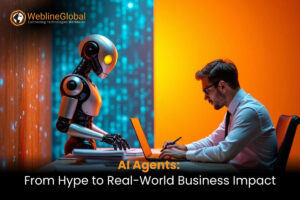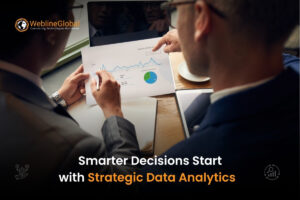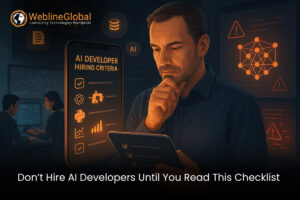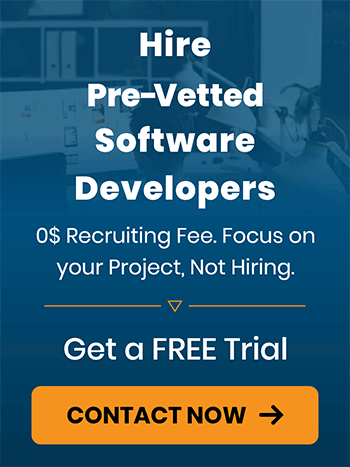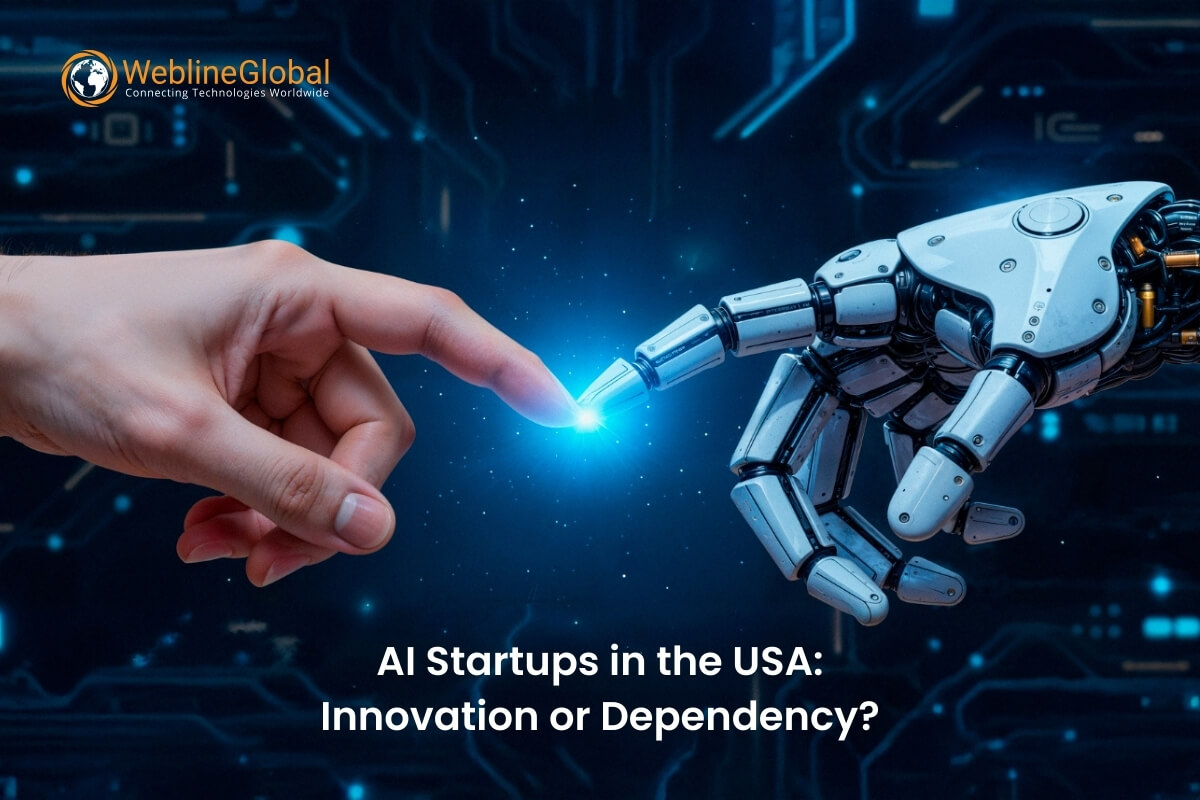
As startup ecosystems continue to expand, the role of artificial intelligence has grown from a competitive advantage to what many perceive as a survival requirement. Many startups, particularly in the United States, seem inherently tied to AI in USA initiatives. The reliance isn’t limited to AI-enabled products; it extends to core infrastructure, analytics, customer service, and operational automation. This raises a critical question: Are these startups genuinely innovating or simply building a business model glued to a dependency on machine learning and AI trends?
Startups often face high burn rates, tight funding cycles, and pressure to deliver scalable solutions fast. In such conditions, the promise of an AI software development company in USA acting as both an enabler and a crutch cannot be ignored.
Whether operating in greenfield software development or extending legacy systems through brownfield software development, startups are wrapping their entire go-to-market around intelligent systems. But what are the real consequences?
Need AI guidance for startup? Partner with WeblineGlobal – your trusted AI development company in USA.
The AI Boom: A Crutch or Catalyst?
The explosion of AI in USA isn’t a bubble—yet. It has created an environment where being an AI startup in USA almost guarantees investor interest. However, this advantage comes with an underlying dependency. Too many startups are launching without a validated product-market fit, instead banking on AI as a fix-all solution.
Key reasons why startups fall into this AI trap:
- Pressure from VCs: Investors expect cutting-edge innovation, often pressuring founders to shoehorn AI, regardless of actual relevance.
- Market Expectations: Customers increasingly expect intelligent automation as a basic feature.
- Recruitment Trends: Startups attract talent by claiming they work on the next big AI breakthrough.
This high-level AI integration, while often technically impressive, can result in brittle infrastructures and overspecialization.
AI and ML Solutions: When It Works and When It Doesn’t
Some startups build their entire architecture on AI and ML solutions, enabling predictive analytics, dynamic personalization, or intelligent workflow orchestration. These solutions excel when applied to complex problem domains like genomics, real-time fraud detection, and demand forecasting.
But pitfalls emerge when:
- AI is introduced where deterministic code would be more efficient.
- Startups lack access to high-quality data to train accurate models.
- Maintenance becomes an issue due to the black-box nature of deep learning models.
In such cases, being seen as an AI startup in USA becomes a liability. As the initial hype fades, delivering real value becomes harder without robust fundamentals and transparent models.
Software Development Choices: AI and Beyond
Choosing between greenfield software development and brownfield software development also plays a role in how dependent a startup becomes on AI. Greenfield projects allow building AI-native architectures from scratch, making it easier to embed AI logic at the core. However, that freedom often leads to overcomplication.
In contrast, brownfield projects often require AI to function as a plug-in or enhancement layer. Here, AI becomes an optimizer rather than the core, leading to better ROI and risk mitigation.
Whether working with an AI software development company in the USA or an in-house team, these decisions affect scalability, maintainability, and eventual success.
Over-Promising and Under-Delivering: The AI Sales Trap
Sales teams often push AI as a central value proposition. Founders, driven by investor enthusiasm and media buzz, may exaggerate capabilities to gain traction. This creates a feedback loop of inflated expectations.
What follows is:
- Mismatch between capabilities and claims
- Extended development timelines
- Mounting technical debt
- Customer churn due to unmet expectations
For startups without a deep technical foundation, partnering with a skilled AI software development company in USA is critical. Yet, too many engage with off-the-shelf solutions or half-baked tools, resulting in patchy performance.
Struggling with AI dependency? Let WeblineGlobal build you sustainable, scalable solutions.
The Shift Toward AI Agents and Agentic Solutions
Some of the more forward-thinking AI startups in USA players such as WeblineGlobal, have begun exploring the next frontier of artificial intelligence: AI agents and agentic solutions. These systems are designed to operate autonomously across multiple platforms, executing tasks traditionally handled by human users. From scheduling meetings and managing emails to analyzing financial reports or orchestrating supply chain logistics, these agents aim to reduce human workload, cut operational costs, and improve response times.
Unlike traditional AI models that require human initiation and interpretation, AI agents are built to act independently based on predefined goals, real-time data, and environmental context. They can integrate with APIs, databases, and third-party platforms, making them ideal for dynamic, cross-functional workflows. The ultimate promise is the creation of self-governing digital entities capable of learning, adapting, and making decisions at scale.
However, developing functional agentic solutions is technically challenging. These systems demand:
- Advanced orchestration layers that can manage multi-step tasks across diverse software ecosystems
- Constant monitoring to detect deviations, errors, or potentially harmful outcomes
- Contextual reasoning capabilities so agents can make decisions not just based on data, but on intent and situational awareness
Without these critical components, even the most sophisticated AI agents risk becoming ineffective—or worse, introducing vulnerabilities. Autonomous agents can expose systems to threats like data leaks, unauthorized access, or erroneous decision-making when improperly supervised.
While the concept is compelling, AI agents are far from a universal solution. For startups, diving into this realm without strategic planning and the support of an experienced AI software development company in USA can quickly lead to operational breakdowns rather than innovation.
Scaling Challenges and Technical Debt
Startups that build their entire stack on AI frequently encounter issues as they attempt to scale:
- Inconsistent inference results under different data conditions
- High costs of cloud computing solutions for model training and deployment
- Versioning problems with model updates
- Security vulnerabilities around model poisoning or adversarial attacks
Instead of scalability, many startups hit a wall. A dependence on black-box AI systems without fallback mechanisms leaves systems brittle and prone to outages. Partnering with a reliable AI software development company in USA helps manage these scaling hurdles more effectively.
When AI Is the Product: Double-Edged Sword
In sectors like edtech, fintech, and healthtech, AI is not just a feature; it is the product. For example:
- Edtech tools using NLP for real-time grammar correction
- Fintech startups deploying ML for credit risk assessment
- Healthtech devices offering predictive diagnostics
Here, the AI startup in USA becomes uniquely vulnerable. If their AI fails, so does their product. Unlike traditional software, AI performance is probabilistic. It doesn’t always produce consistent outcomes—posing a challenge for QA and customer support teams.
Startups must incorporate strong MLOps practices and build transparency layers into their AI architecture. AI must explain itself—not just function.
Investment Patterns: Are VCs Fueling the Dependence?
Venture capital firms, especially those focused on SaaS and tech, are aggressively backing startups that mention AI in USA as a core differentiator. This investor bias creates skewed funding patterns, where real innovation may be overlooked in favor of trendy AI applications.
As a result:
- Non-AI startups struggle to get early traction.
- AI-first companies receive inflated valuations.
- Exit strategies become harder if the AI underdelivers.
Startups need to present a balanced narrative. AI is a tool—not the identity. Without tangible outcomes, the AI label becomes a liability.
WeblineGlobal: The Right Partner for Building Sustainable AI-Driven Startups
For startups navigating these complexities, partnering with an expert like WeblineGlobal can help strike the right balance. As a U.S.-based IT staff augmentation company with a global reach, WeblineGlobal offers access to expert developers and designers through its India-based development hub.
Whether your startup is engaging in greenfield software development or transforming legacy systems through brownfield software development, WeblineGlobal has the technical talent and strategic insights to support you. If you’re looking to work with a trusted AI software development company in USA, WeblineGlobal provides full-cycle development services with a proven track record.
Scalable architecture, secure deployment, ML model lifecycle management, and post-launch monitoring are all part of the package. Build smarter—not just faster—with the right people behind your code.
Social Hashtags
#AIStartups #USAStartups #ArtificialIntelligence #TechTrends #MachineLearning #StartupGrowth #AIInnovation #BusinessTechnology #AIUSA
Ready to future-proof your startup with AI? Connect with WeblineGlobal today and scale smarter!
